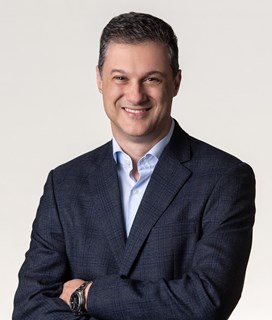Feed additives are often categorized based on where they come from – think phytogenics, or postbiotics, for example. However, at the end of the day, what matters is the impact each molecule is having – on other dietary ingredients, on the microbiome, or on the animal’s own physiology.
Breaking down traditional silos and looking transversally for new solutions to the complex challenges facing animal nutrition is the idea behind the recent launch of Cargill’s Micronutrition and Health Solutions (MHS). Today, we hear from Adriano Marcon, President of Global MHS and Cargill Animal Nutrition Americas, Gilles Houdart, Global Business Director for MHS, and Christos Antipatis, Strategic Marketing & Technology Director for MHS, to better understand what Cargill’s Micronutrition and Health Solutions is aiming to do and what kinds of solutions it can be expected to bring to the industry.
[Feedinfo] Can you explain what Micronutrition and Health Solutions (MHS) is, and how it fits within the larger Cargill Animal Nutrition organisation?
|
[Adriano Marcon] Micronutrition and Health Solutions (MHS) is the name of a global business within Cargill Animal Nutrition & Health (ANH) that applies a holistic approach to animal nutrition with a broad portfolio of science-based products, services and digital solutions that go beyond feed additives solutions and consider all microelements (microorganisms, molecules, micronutrients) impacting animal diets to optimize animal performance and health. |
Adriano Marcon |
MHS is deeply rooted in nutritional science and combines our research and innovation capabilities with our sustainability commitments to maximize productivity and promote the digestive health and nutrient utilization of the animal. Our portfolio provides solutions for all needs with existing offerings in postbiotics, phytogenics, anti-mycotoxin agents, organic acids, chelates or aromas, antioxidants, and enzymes.
Leveraging our deep technical and commercial expertise with go-to-market reach in over 40 countries worldwide and real-world application in animal nutrition, along with our understanding of the challenges faced by customers, MHS focuses on delivering solutions in a precise manner: the right product at the right time with the right amount.
[Feedinfo] In what ways is MHS distinct from how Cargill had previously been approaching the animal nutrition and health sectors?
[Adriano Marcon] The MHS business was created to harness the power of our global team, resources, and capabilities in postbiotics, phytogenics and additives, including enzymes, antioxidants, and anti-mycotoxin agents, to deliver and grow an enhanced science-based micronutrition portfolio that leverages Cargill’s strengths in research & development, innovation, and manufacturing. MHS is the growth engine for the product brands of Diamond V, Delacon, and Provimi additives.
Our aim is to combine our deep understanding of nutrition and microbiome expertise to fuel new product development to help support customer production goals and solve their business challenges.
[Feedinfo] The word “micronutrient” in animal nutrition has traditionally been used to refer to vitamins or minerals, but Cargill is not particularly talking about vitamin and mineral nutrition when it uses the word “micronutrition” in MHS. Can you explain your concept of “micronutrition”?
|
Christos Antipatis |
[Christos Antipatis] The word micronutrition in our MHS business name refers to science-based animal nutrition technologies, going beyond vitamins, minerals, and typical feed additives solutions to understand nutrition at the deepest level. Micronutrition considers the impact of every microelement interacting with each other in the animal’s diet, and interacting with the microbiome. Based on these findings we offer innovative micronutrition solutions that support the health and performance of the animal in its entirety. |
Micronutrition focuses on delivering holistic feeding solutions that lead to overall improvement of animal health while reducing nutrient waste and the use of antibiotics (where they are still allowed), helping customers address specific challenges and maximize the productivity of their animals. The impact of micronutrition is measurable and scientifically proven. Focusing on micronutrition is important to optimize nutrient utilization and the microbiome while helping strengthen the immune system, specific organs, and support offspring through transgenerational effects.
[Feedinfo] How does the launch of MHS fit in with Cargill’s concept of “Discovering the power of the Microverse”, which it has previously spoken about with Feedinfo?
|
[Gilles Houdart] We developed the concept “Discover the power of the Microverse” to accelerate our exploration of the complex ecosystem offered by nature and our understanding of how all microelements interacting in an animal diet can influence the microbiome to uncover breakthrough technologies that can help animals thrive. |
Gilles Houdart |
The Microverse encompasses microorganisms, molecules, and micronutrients that can be further developed into new technologies. We dive into the world of micronutrition with intentional and precise use of micronutrients to optimally feed the animal microbiome. This is the source and the origin of Micronutrition and Health Solutions.
With our advanced knowledge of the Microverse™ and our commitment to invest in this new frontier, MHS is accelerating growing one of the world’s largest, most diverse, scienced-based portfolios of products, services, and solutions to support health in livestock and pets in all of life’s stages.
[Feedinfo] What role will digital technology or service offerings play in the MHS portfolio?
[Gilles Houdart] A key benefit of partnering with MHS is that we can provide a holistic approach to animal nutrition. Leveraging the power of Cargill’s deep expertise and suite of digital offerings, we provide producers with the right set of tools that enable efficient and effective operations by simplifying feed ingredient selection, healthy diet design and formulation, feed inventory management, and feed mill operation.
For example, the Cargill Nutrition System (CNS) offered in some markets includes research, methodology and a database that combines Cargill’s knowledge surrounding what animals need in order to grow and be healthy, and the raw materials that feed those animals. CNS allows for precise feed formulations tailored to our customer’s unique operations, addressing variables like species, climate, geography and targeted business goals. With the largest global data set and innovative research at its core, CNS delivers precise formulations and diets, constantly adapting to an ever-changing market. With CNS, animals perform better and waste less.
PANORAMA™ is a flexible scenario planning tool that helps broiler operations make confident decisions for the best economic results. It is a great example of real time control and considers market volatility and production complexities enabling more precise diets.
Galleon™, a microbiome assessment platform and one of Cargill’s latest innovation, is an analysis tool that helps you determine how the gut microbiome of your flock is related to their nutrition and health, and your management practices. By using Galleon analysis to assess gut microbiome health, customers can be confident in their decisions by turning insights into informed action to support improved profitability, performance, and the health of your flock. Galleon has been used in more than 100 trials around the world to analyse nearly 30,000 samples, employing artificial intelligence (AI) and advanced statistical modelling techniques to determine the most important bacteria linked to performance, pathogens prevalence, and food safety.
These are just a few examples of how we can leverage digital and data-driven solutions to help customers with informed and confident decision-making to navigate animal health challenges and gain predictability.
[Feedinfo] If I’m not mistaken, Cargill rolled out the concept of micronutrition in late 2023. Why do you believe this is a particularly important step for the company to take right now?
[Gilles Houdart] Our customers face increased complexity as they balance animal health and welfare, performance, and business economics while reducing their environmental footprint.
We feel our positioning as Micronutrition & Health Solutions is unique in the industry and can add more value to customers that are looking to improve digestive health and maximize productivity. We are able to offer a world class, science-based portfolio that includes postbiotics and phytogenics, nutritional and microbiome expertise which fuels new product development through real-world research, like Galleon™, trusted digital and data-driven solutions like Panorama™ and MAX™ and high-quality solutions produced in state-of-the-art manufacturing sites. Our specialized local teams harness the power of our global capabilities as they partner with customers to solve business challenges.
[Feedinfo] What should the industry expect from MHS in 2024? What are some of the most urgent challenges where Cargill MHS believes it can make a difference?
[Christos Antipatis] We are leveraging our size, scale, and experience to provide customers with tailored products and solutions to maximize animal productivity and digestive health through science-based animal nutrition.
Our focus on the Microverse has enabled us to accelerate our innovation pipeline with both new postbiotics and phytogenic solutions, leveraging interactions between very specific postbiotics and phytogenics to help address key customer unmet needs: zero nutrient waste, reducing livestock emissions, reducing antibiotic or ionophores usage, strengthening immunity, and alternatives to zinc oxide, to name a few. Through in-house developments, partnerships like the one with BASF in enzymes, and mergers and acquisitions, we aim to strengthen our portfolio in existing product categories, as well as develop new and emerging offerings to meet evolving customer needs.
There are already promising scientific outcomes of our latest new product innovation Dia V™-MB Pro for broilers. We are seeing outstanding performance results in our trials with very high consistency, through combined action of phytogenics and postbiotics, and are seeing great commercial adoption by customers.
We will launch a portfolio of new products in this field soon. And we continue to explore our library of actives to better understand individual molecules’ modes of action and benefits, conduct intensive R&D, both in vitro and in vivo, screen new actives and combinations to identify synergies so that we can provide holistic approaches to our customers, combining nutrition, digital solutions, and management practices with the right product for the right purpose.
In terms of the most urgent challenges, we recognize that sustainability is a critical part of customer operations. As part of our Reach4Reduction™ holistic approach to methane mitigation, we are investigating new science-based practices and solutions to address methane production beyond traditional feed and animal nutrition. Feed additives solutions like phytogenics and rumen modifiers, for example, can directly influence enteric fermentation and methane reduction. Our aim is to uncover nutrition’s power to do more with less to feed the world and protect the planet.
Published in association with Cargill Animal Nutrition and Health






